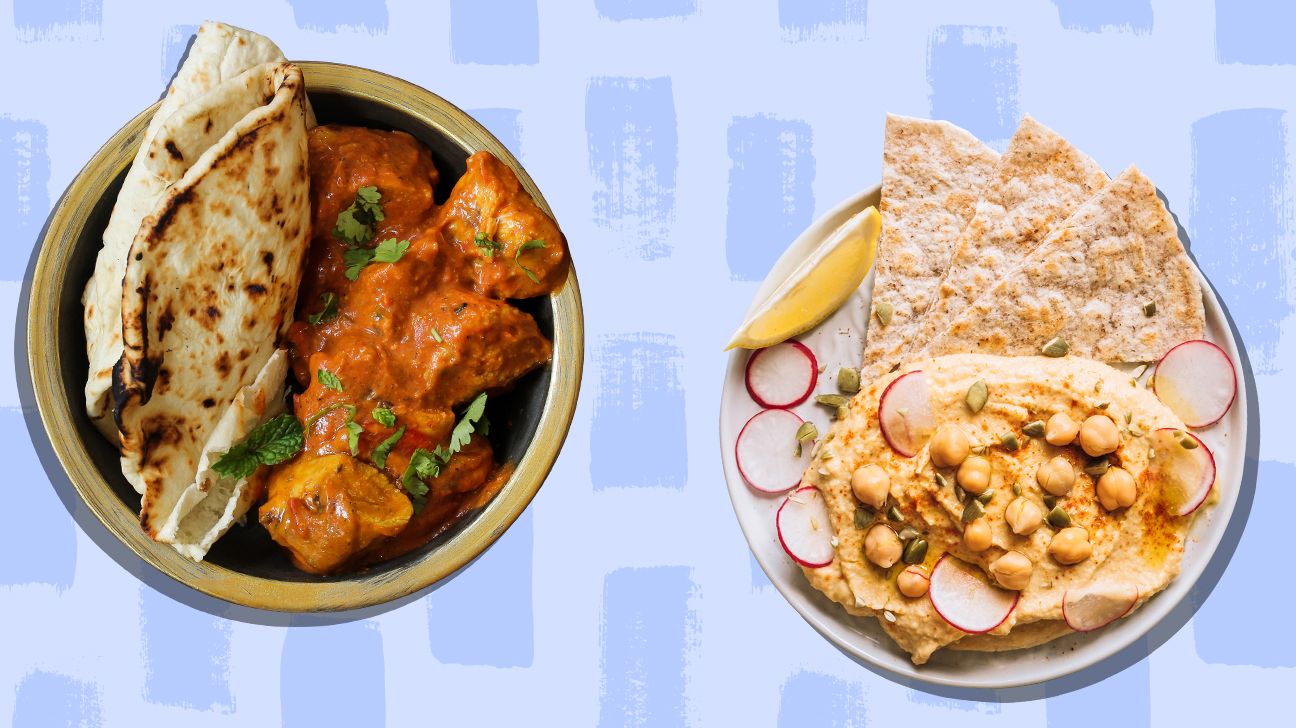One is fluffy, bubbly, and often oval-shaped. The other is circular and has these wonderfully convenient pockets, perfect for sandwiches. Those are the two most noticeable differences between naan and pita — both round, slightly leavened wheat flatbreads. You can brush them with oil or butter and sprinkle spice blends or herbs on them, if you so desire. They both make handy substitutes for pizza crust too.
Usually softer, naan originates in India, by way of Persia. The name comes from the Persian word, non, for bread. Unlike pita, naan has yogurt, milk, and sometimes eggs or butter in it, resulting in a softer texture. When the dough is made, bakers shape it into a ball and slap it on the interior walls of a tandoor, a clay oven. The bread puffs up and bubbles as it cooks. There are skillet ways to cook naan, but it doesn’t produce the truly authentic version. Sometimes naan is stuffed, but it’s eaten flat and as one joined piece.
Believed to be much older, pita has fewer ingredients — just flour, salt, water, and yeast — and originates in the Middle East, spreading to the eastern Mediterranean and wheat-eating areas of Europe, Asia, and Africa. The English word, pita, comes from Greek. Pita is easier to make also because it can be made in a modern oven. It’s a little tougher and drier, but when you cut the circle in half, the bread opens into two pockets. Those pouches are ideal for filling with all sorts of meats, vegetables, and sauces, like a sandwich. People love to put falafel inside the pouch.
Both of these breads can be brushed with olive oil, spices and herbs. They’re great for making flatbread pizzas and for scooping into dips. Interested in making your own or simply some good recipes that accompany these flatbreads? We’ve brought you six recipes that call for naan and pita.
Yeasted, yogurt-enriched naan is traditionally baked by slapping the oval rounds of dough on the inside walls of the tandoor oven. Assuming you don’t have a tandoor at home, we suggest two options for cooking: a cast-iron skillet, which yields a dense and chewy naan, or a backyard grill, which turns out a fluffy naan with a crisper crust. Get our easy naan bread recipe.
2. Lamb Pitas with Cucumbers and Yogurt
You can transform leftover lamb (or other meat, or falafel) into a satisfying pita sandwich without much effort at all. Get our lamb pitas with cucumbers and yogurt recipe.
Popular in northern India, chole masala is involves simmering chickpeas and tomatoes with fried garlic, ginger, onion, chiles and traditional Indian spices. Mop up the goodness with some naan. Get our chole (chana) masala recipe.
Use up your leftover pita by making this easy breakfast pizza of sorts. There’s an egg, so it totally qualifies as the proper accompaniment to your coffee. Get our breakfast pita pizza recipe.
This Indian greens stew typically has paneer cheese, but crispy cubes of tofu work just fine as a substitute. Onion, garlic, and ginger mingle with spices, cream, and frozen chopped spinach. Scoop up this creamy, comforting dish with naan. Get our saag with tofu recipe.
To make your pita wedges a more dependable, non-bendy scooping vehicle from bowl to mouth, make crunchy pita chips for any dip, from hummus to roasted eggplant. Get our baked pita chips recipe.

